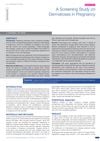 24 citations,
June 2011 in “International Journal of Dermatology”
24 citations,
June 2011 in “International Journal of Dermatology” Most pregnant women experience skin changes like darkening and itching, while serious skin conditions are rare but need early treatment.
 12 citations,
April 1990 in “PubMed”
12 citations,
April 1990 in “PubMed” Pregnancy can cause skin changes like pigmentation, stretch marks, and temporary hair loss, which often worry the expectant individual.
 13 citations,
June 1984 in “Postgraduate Medicine”
13 citations,
June 1984 in “Postgraduate Medicine” Pregnancy can cause various skin changes, including pigmentation, acne, and stretch marks, and may affect preexisting skin conditions.
 33 citations,
August 2006 in “Journal der Deutschen Dermatologischen Gesellschaft”
33 citations,
August 2006 in “Journal der Deutschen Dermatologischen Gesellschaft” Pregnancy can cause specific skin conditions that need correct diagnosis and treatment to protect both mother and baby.
 April 2017 in “International journal of current advanced research”
April 2017 in “International journal of current advanced research” Pregnant women often have skin changes, but only a small percentage have skin conditions caused by or specific to pregnancy; doctors need to tell them apart for proper treatment.
 December 2023 in “International journal of research in dermatology”
December 2023 in “International journal of research in dermatology” Most pregnant women experience common skin changes like linea nigra and stretch marks.
 January 2023 in “Our Dermatology Online”
January 2023 in “Our Dermatology Online” Most pregnant women experience skin changes, especially increased pigmentation.
45 citations,
January 2016 in “Journal of Epidemiology and Global Health” Most pregnant women experience skin changes, with hyperpigmentation being the most common.
 9 citations,
January 2017 in “Journal of Clinical and Diagnostic Research”
9 citations,
January 2017 in “Journal of Clinical and Diagnostic Research” Most pregnant women experience skin changes, mainly increased pigmentation, and some develop pregnancy-related skin conditions and infections.
 141 citations,
January 1984 in “Journal of The American Academy of Dermatology”
141 citations,
January 1984 in “Journal of The American Academy of Dermatology” Pregnancy can cause skin darkening, varicose veins, more sweating, hair growth, hair loss after birth, nail changes, and gum inflammation.
 3 citations,
January 2018 in “Indian Dermatology Online Journal”
3 citations,
January 2018 in “Indian Dermatology Online Journal” Most pregnant women in Northeast India experience normal skin changes, with specific pregnancy-related skin conditions being rare.
 August 2009 in “Expert Review of Dermatology”
August 2009 in “Expert Review of Dermatology” Pregnancy can cause skin changes and conditions that need correct diagnosis and treatment for the health of the mother and baby.
 88 citations,
January 2011 in “Annals of Dermatology”
88 citations,
January 2011 in “Annals of Dermatology” The document concludes that specific itchy skin diseases during pregnancy have varying fetal risks and treatments, including corticosteroids and other medications.
 6 citations,
September 2013 in “The Obstetrician & Gynaecologist”
6 citations,
September 2013 in “The Obstetrician & Gynaecologist” Pregnancy can cause unique skin issues, some of which may risk the mother and baby's health and need careful treatment.
 71 citations,
February 2006 in “Clinics in Dermatology”
71 citations,
February 2006 in “Clinics in Dermatology” Pregnancy causes skin changes like darkening, hair thickening, nail changes, and increased risk of skin growths, most of which usually resolve after birth.
 34 citations,
June 2014 in “The BMJ”
34 citations,
June 2014 in “The BMJ” Pregnancy can change skin disease severity, with some conditions improving and others worsening, and treatment should balance benefits and fetal safety.
 24 citations,
March 2015 in “Best Practice & Research in Clinical Obstetrics & Gynaecology”
24 citations,
March 2015 in “Best Practice & Research in Clinical Obstetrics & Gynaecology” Some skin conditions are common during pregnancy and can be safely treated without affecting the pregnancy outcome.
 3 citations,
November 2010 in “Rheumatic Diseases Clinics of North America”
3 citations,
November 2010 in “Rheumatic Diseases Clinics of North America” Pregnancy can cause symptoms similar to rheumatic diseases, making diagnosis difficult, and affects various body systems, requiring careful distinction between normal changes and serious conditions.
 98 citations,
December 2008 in “Journal of Investigative Dermatology”
98 citations,
December 2008 in “Journal of Investigative Dermatology” Prolactin affects hair growth and skin conditions, and could be a target for new skin disease treatments.
 18 citations,
June 1995 in “International Journal of Dermatology”
18 citations,
June 1995 in “International Journal of Dermatology” Women experience various skin issues at different life stages, requiring careful treatment and awareness.
 3 citations,
January 1985 in “PubMed”
3 citations,
January 1985 in “PubMed” Hormonal birth control can cause skin issues, but low-dose options and those with antiandrogens may reduce these effects.
1 citations,
January 2018 in “Cogent Medicine” Careful management of steroid use is crucial in pregnant women with bullous pemphigoid to avoid complications like Cushing syndrome.
 64 citations,
June 1992 in “International Journal of Dermatology”
64 citations,
June 1992 in “International Journal of Dermatology” Pregnancy often causes skin changes like darkening, stretch marks, and hair growth, which may improve after childbirth.
 41 citations,
October 2017 in “International Journal of Women's Dermatology”
41 citations,
October 2017 in “International Journal of Women's Dermatology” Most pregnant women experience skin darkening and hair changes, with these effects usually going away after giving birth.
 7 citations,
October 2015 in “American Journal of Primatology”
7 citations,
October 2015 in “American Journal of Primatology” Monkeys with hair loss during pregnancy showed higher stress hormone levels and invested differently in their offspring.
 96 citations,
January 1997 in “Clinics in Dermatology”
96 citations,
January 1997 in “Clinics in Dermatology” Pregnancy can cause skin pigmentation, stretch marks, and changes in hair, nails, and sweat glands, with most resolving after birth.
 87 citations,
July 2012 in “Expert Review of Clinical Immunology”
87 citations,
July 2012 in “Expert Review of Clinical Immunology” Pregnancy can increase lupus activity, but careful planning and treatment can improve outcomes.
 47 citations,
May 2002 in “Journal of Cutaneous Medicine and Surgery”
47 citations,
May 2002 in “Journal of Cutaneous Medicine and Surgery” Pregnancy can cause normal skin changes that usually go away after childbirth and don't need treatment.
 51 citations,
February 2006 in “Clinics in Dermatology”
51 citations,
February 2006 in “Clinics in Dermatology” Pregnant women often experience skin and hair changes, with over half getting stretch marks and pigment changes, and should be cautious with cosmetic procedures due to potential risks.
 35 citations,
December 2014 in “Clinical Obstetrics and Gynecology”
35 citations,
December 2014 in “Clinical Obstetrics and Gynecology” Most skin changes during pregnancy go away after giving birth.




























